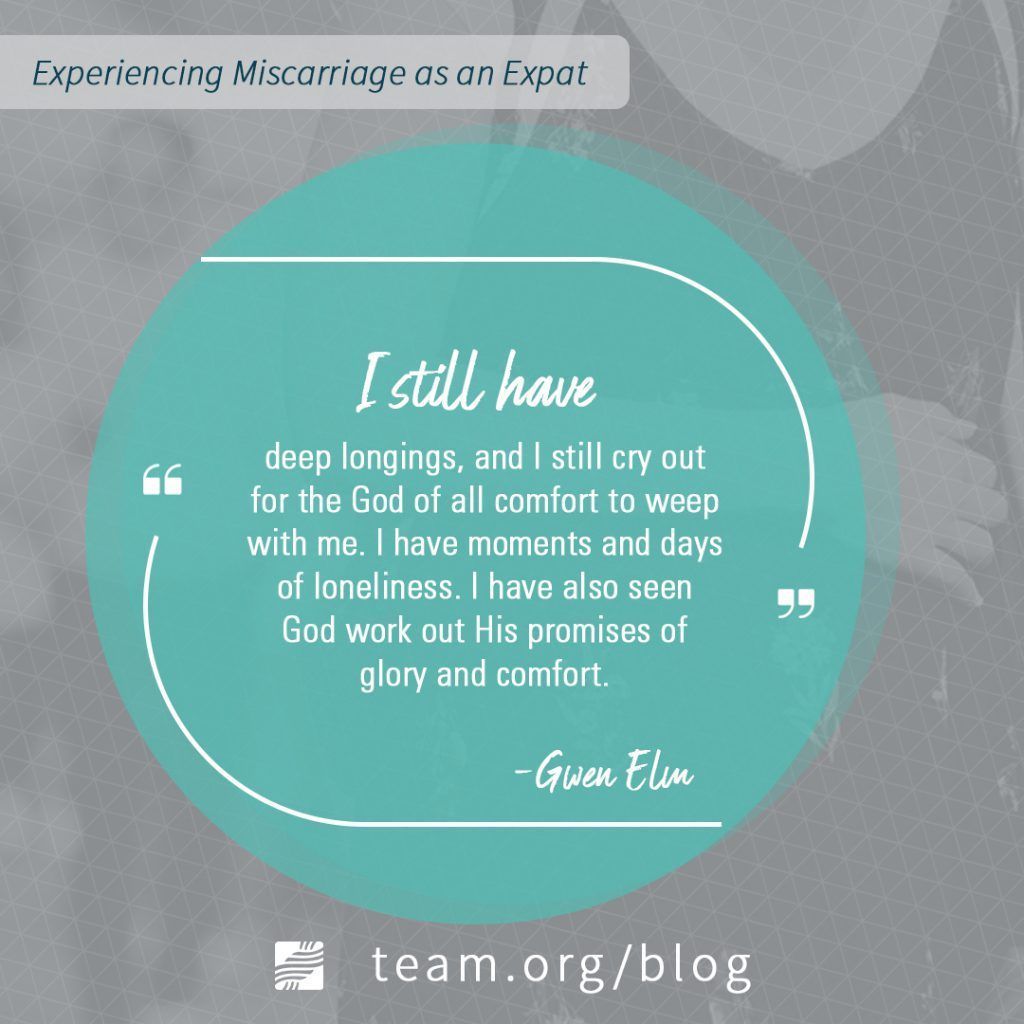I sat on the frigid, white-tiled bathroom floor, cradled in my husband’s arms as I wept and bled. We had arrived early at this remote hilltop resort to set up a few things up for our annual conference. Moments before we were expected to go out and greet everyone, I lost the baby we were expecting .
I walked out of the bathroom into the cold, heatless room and stared at the white sheets on the hotel bed. I wanted to be anywhere but at the hotel, surrounded by people.
Having just finished our year and a half language program, we were looking forward to annual conference that year. It felt like a time marker as we transitioned into new opportunities. By starting off with a relaxing week with our teammates, encouragement from the Word and singing praise songs in English, we felt like this was the perfect way to set the tone for the new season.
My expectations came crashing down when our sacred space was violated and took on an unexpected tone of trauma, grief and shame before the welcome dinner even kicked off. I didn’t want anyone to know my shame, and yet I found myself needing support.
Over meals I barely picked at and coffee breaks between sessions, I slowly shared with the ladies on our team. I was met with silence, a pregnancy announcement, a hug, prayer, and one close friend who just sobbed with me. A small part of me was thankful that each woman that I shared with hadn’t experienced loss in this way, but the bigger part of me ached with loneliness.
The Social Weight of Miscarriage
In the coming weeks, we decided to share with a few close South Asian friends about our loss. Sharing our vulnerability brought us closer to them, but I also learned that grief, pregnancy and fertility all have their cultural wrappings as well.
Culturally, it is expected that the couple will have a child in the first year of marriage. When the family hasn’t grown, the blame falls to the wife.
Because of daily interactions with acquaintances that reminded me of my loss (because I’m childless despite being married for nearly seven years), I believed that my local friends couldn’t care about my loss and grief. I let people’s suggestions that my husband take a second wife or that I could be taken off his hands ring loudly in my mind and heart. These were lies.
In those first few months after we lost our child, I felt like a piece or me was left at that hilltop resort. I wanted to find someone who had experienced loss exactly as I had experienced it. I believed that they had to understand everything in order to value my story.

Because none of my expat friends had lost a child abroad, I arrogantly assumed they understood nothing about my grief. I believed this lie, even though every expat has experienced grief; “goodbye” is the club motto ! Somehow, I believed my experience must be superior to any other loss or grief they had walked through.
Alone in My Arrogance
The root of my arrogance and shame was insecurity. My arrogance and full belief of these lies kept me from reaching out to the friends. I did not allow myself to bear my vulnerabilities. I felt alone and isolated because the enemy had convinced me that I was. Like a smelly onion, the Lord has been working to peel off each stinky, arrogant, and insecure layer.
One thing I have learned about grief and trauma is that everyone wades through them differently. It says in 2 Corinthians 1:3–4 that we have been given the God of all comfort so that we can comfort others. Sharing our vulnerabilities, weakness and pain allows us to build friendships .
Maybe you are reading this because you, too, have experienced the loss of a baby while abroad and you just want someone who will listen to the extra layers of grief, confusion and isolation you feel. I am so sorry for the loss you have experienced and the isolation that you feel. I wish I could sit with you and just hear your story and how much you love this baby that you won’t get to meet this side of glory.
Don’t believe the lies that you are alone, though the enemy will try and yell them as loudly as possible.
Vulnerability and Grace
Being vulnerable isn’t easy. Friends won’t respond in the way you want them to. I have learned that if there is going to be room for vulnerability in friendship, there also must be room for grace — but it’s hard to make room for both. It’s easy to focus on the aspects of your story that people won’t understand, rather than on the things that they will.
This grief you are wading in can be used for God’s glory. I know this sounds impossible, but that is what 2 Corinthians 1:3–4 says. How is He showing you His comfort so that you can be a comfort to others?
I know His promises, and I know His truth, even if I fail to cling to them some days.

I still see the months, years and milestones tick by. Cold hotel bathrooms trigger a sadness and fear in me, and annual conferences will always be slightly marred. I still have deep longings, and I still cry out for the God of all comfort to weep with me. I have moments and days of loneliness.
I have also seen God work out His promises of glory and comfort.
We Can’t Dictate His Glory
In the months following the miscarriage, I thought that this glory and comfort would take the form of a swollen pregnant belly. That’s not the way He is writing the story right now.
He has brought about His glory in much more creative ways than I originally defined. That He could bring glory to hopeless situations is truly miraculous and something that I must prod myself to look for . That He would choose my life as a canvas to paint those stories is unfathomable to me.
You can look to Him to write those stories in your life, too. I encourage you to look beyond the small definitions of hope and resolution that you have written; we serve a God who is so much bigger than we can hope to fathom.
If you are looking for helpful resources, I recommend a podcast called The Joyful Mourning by Ashlee Proffitt and the book Grace Like Scarlett by Adriel Booker. These resources have been helpful for me to come back to again and again.




















